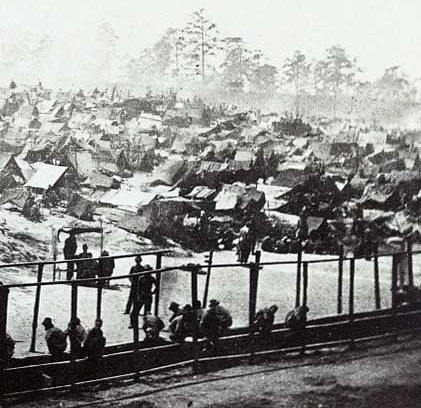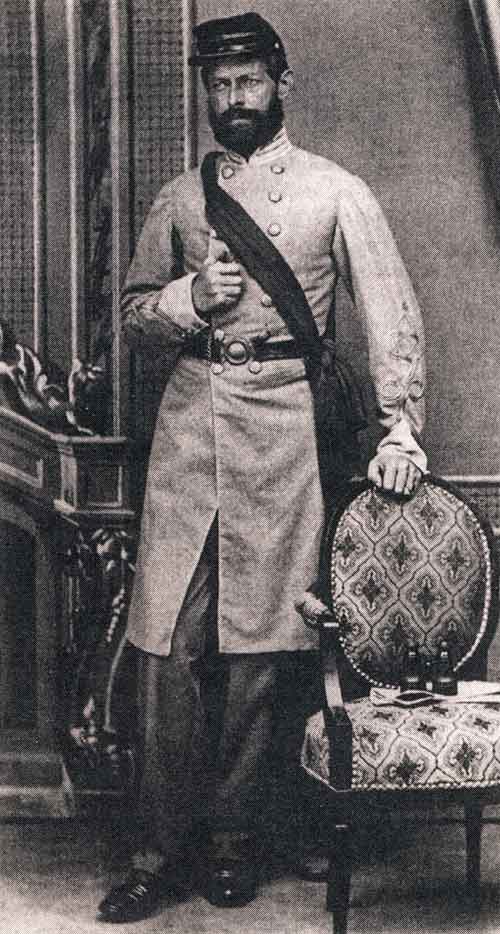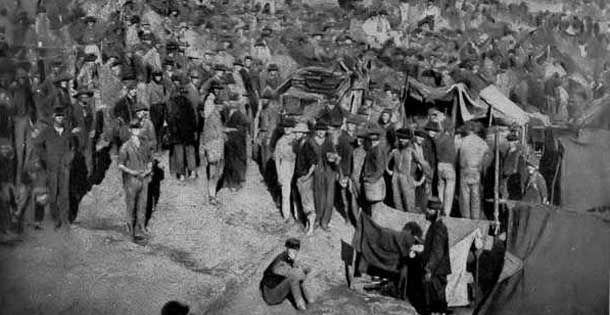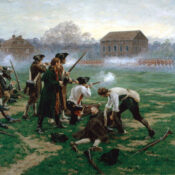Of the 45,000 Union soldiers who’d been held at Andersonville Confederate prison during the American Civil War, 13,000 died. During the worst months, 100 men died each day from malnutrition, exposure to the elements, and communicable disease.
Restoring unity in America after the Civil War was never going to be easy. Too many Americans felt they could never forgive wrongs committed by the enemy during the conflict. Southerners could point to the destruction wrought by General Sherman’s army on its destructive march through Georgia and South Carolina. And Northerners could point to Andersonville.

This Confederate prisoner-of-war camp, which opened 150 years ago this week, was built in southeast Georgia to hold the Union prisoners who could no longer fit into Virginia’s prison camps.
Its stockade, in which prisoners were detained, measured 1,600 feet by 780 feet, and was designed to hold a maximum of 10,000 prisoners.
The prisoners arrived before the barracks were built and so lived with virtually no protection from the blistering Georgia sun or the long winter rains. Food rations were a small portion of raw corn or meat, which was often eaten uncooked because there was almost no wood for fires. The only water supply was a stream that first trickled through a Confederate army camp, then pooled to form a swamp inside the stockade. It provided the only source of water for drinking, bathing, cooking, and sewage. Under such unsanitary conditions, it wasn’t surprising when soldiers began dying in staggering numbers. The situation worsened as the camp became overcrowded. Within a few months, the population grew beyond the specified maximum of 10,000 to 32,000 prisoners.
After 15 months of operation, the camp was liberated in May of 1865. Of the 45,000 soldiers who’d been held at Andersonville, 13,000 died. During the worst months, over 100 men died each day.
News of the conditions at Andersonville came slowly to the North. The name wasn’t even mentioned in the Post until the following March, when the notices on page 7 announced the death of Robert Price “at Andersonville, Ga.…of chronic diarrhea.” A member of the 118th Pennsylvania Volunteers, he “was taken prisoner by the rebels, May l5th, 1864” and managed to survive just three months in the camp.
As news of the death camp reached the newspapers, Northerners were newly enraged at the South and its army. Hearing of the miserable conditions and high death rate in the camp, Walt Whitman wrote, “There are deeds, crimes that may be forgiven, but this is not among them.”
Andersonville’s reputation was widely known when its name next appeared in the Post. In 1865, the Post’s front page featured a poem by Miss Phila H. Case, “In the Prison at Andersonville.” In this sentimental ballad, a narrator and his brother Ned are captured and shipped to Andersonville, where the brother soon sickens.
“He faded day by day—a prayer
Upon his lips for one sweet breath—
What wonder when the reeking air
Was chill and dank with dews of death.
But why delay my tale—he died
And careless hands bore him away,
For what was one when, side by side,
Hundreds were dying every day?”
In July, 1865, the Post reported “the former Rebel commandant [Jeff Davis] of the Andersonville prison is to be put on trial at Washington this week before a court-martial.” It adds no further comment, but an item just a few lines lower on the page reflects the bitterness many in the North were feeling. “Jeff Davis is reported, by the latest advices from Fortress Monroe, in the best of health and spirits.”
Many Northerners had expected the Federal government would hang the president of the Confederacy once he was caught after the war. But Davis, though indicted for treason, was never brought to trial. At the time the Post item above appeared, he was, in fact, living in leg irons and gravely ill. At the end of two years, the federal government released Davis on a bail of $100,000. The money was donated by Southern supporters as well as former Northern adversaries.
Andersonville’s commandant, Major Henry Wirz, didn’t fare quite as well. He was brought before a military tribunal in August of 1865 and charged with actions intended “to injure the health and destroy the lives of soldiers in the military service of the United States.” The court also charged him with murder “in violation of the laws and customs of war.”

There was no doubt Wirz allowed thousands of Union prisoners to die from exposure and malnutrition. Hundreds of ex-prisoners testified to his brutal punishments. But his defenders, both then and now, have offered several arguments in Wirz’s defense.
The federal government was partly to blame, they said, because it had halted its prisoner-exchange program.
By 1864, the Union army no longer believed it would win the war by a decisive strategic victory on the battlefield. It would have to win by attrition; that is, by wearing down the number of Confederate soldiers by death or capture until the Southern army could no longer fight. This strategy could work because the North had a greater population, and could replace the soldiers it lost, which the South couldn’t.
But the attrition strategy only worked if the Union refused to let its Southern prisoners return home and back into the Confederate army. In return, it meant Union prisoners would have to wait out the war, gathering in growing numbers in Southern prisons that barely had enough resources. However, the policy put a strain on Union camps as much as on those in the South.
Defenders of Wirz also point out the standards of hospitality were low in all prisoner-of-war camps. At the Union army’s camp at Rock Island, IL, for example, 1,300 Confederate soldiers died from an outbreak of smallpox. However, the Rock Island garrison eventually built barracks and a hospital to halt the smallpox epidemic. There were no similar improvements at Andersonville, where the death rate was four times higher than at Rock Island.
Others argued that the Confederacy couldn’t provide for its prisoners because it could barely provide for itself. The South was plagued by shortages because of the Union navy’s blockade of its coast, and the exorbitant costs of supporting its military, which left few resources for feeding or sheltering its prisoners.
These costs, however, were the unavoidable consequence of starting and continuing the war. Union soldiers had given themselves into the Confederacy’s care with the expectation of reasonable safety. Yet the soldiers who marched into Andersonville had less chance of emerging alive than the soldiers who marched onto the battlefield of Gettysburg.
The questions of guilt were troublesome. Obviously it took more than just Henry Wirz to make Andersonville possible. But once a court starts appointing guilt in wartime, it’s hard to tell where it ends.
In this case, it ended with the hanging of Major Wirz in November of 1865. The federal government was so reluctant to appoint blame that he became one of only three Confederates executed for their atrocities during the war.
Become a Saturday Evening Post member and enjoy unlimited access. Subscribe now




Comments
research now show that trauma experienced by our ancestors is often passed down through generations in our genes. We can never meet or have even heard the stories. I used to think these feeling and behaviors were patterns repeated in families. I was very surprised to find this research. Third generation of holocaust survivors and the killing fields in Cambodia. My maternal great-grandfather survived Andersonville. No one talked about this. I learned it from Ancestry. I lot of family history starts to make sense. My opinion: War is a deep human transgression.
I am here due to researching my 2nd-great-granduncle who died in Andersonville Prison in July 1864. He was only 19. He had joined the 1st Cavalry in New York with his horse only 10 months earlier. He was the eldest son of his family; my great-great grandmother was one of his five little sisters.
Though I’ve shed tears for our family over what horrors my uncle James would have gone through at Andersonville, I do not look at it through biased eyes – we who will face the truth know the South was broken and poor could not care for themselves, much less prisoners.
The article says Southerners can point to Sherman; Northerners to Andersonville. We must not dishonor the dead by comparing what was done to civilians to what was done to soldiers. My uncle, though only 19, knew he was signing up for war when he and his horse left the family farm in Alleghany County, New York. He would not have wanted a civilian to know the same. It is also a disgrace to victims of the Holocaust to compare them, as commenters here have done with Andersonville’s soldiers, all men, all veterans of war. Let Andersonville’s horrors be its own; we do not need thoughtless comparisons to comprehend it.
What comfort the writer must live in, what a privileged life, to think prisoners ever “give themselves” into “care” with an “expectation” of “reasonable safety!” It is so very easy to verify how presumptive the writer’s sentence is. Education is free, so let’s learn from someone who was a POW. Read the Andersonville Diary by John Ransom, a POW of Andersonville.
Wow a couple of the comments on here. No wonder your country is so screwed up right now with Covid and Trump….they are interchangeable so either can go first. Sounds like some people think the Civil War was a just war. Sad just sad.
Well that’s an eye-opener! I am not American so reading this brings to light just how brainwashed Southerners are. Their reinvention of Confederacy history and parroted excuses, are reminiscent of the denials concocted for the Nazis.
How it must break the hearts of some of those above when they commemorate the defeat of Their Side on 8 May 1945, wearing a black armband to remember those who fell to preserve their way of life in the Fatherland.
In the monuments debate Americans ignore that most of the Confederate statues were erected by the KKK and their affiliated organisations in the 1920s. The United Daughters of the Confederacy specifically erected a monument in 1908 honoring Wirz the hanged war criminal commandant of Anderson Prison.
The prisoner exchanges stopped because of the massacre of black soldiers at Fort Pillow. Davis and Lee refused to treat black and white prisoners the same, that’s why the prison population soared.
The Confederacy was an evil slave society that treated people worse than animals
The inhumanity at Andersonville made the Nazi death camps seem more humane.. It doesn’t matter which side you favor it was an ignorant abhorrent war. It should never have happened. Our family had 5 brothers on the union side, two died of influenza, o e survived the last six months of Andersonville the worst time to be there. He pealed black strap molasses of the floor that leaked on the floor of the cattle car they rode north on. The vitamins in that saved him from rickets and scurvy. Had be went on regular food right away it could have killed him. Two made home unhurt physically.. This war should not be reenacted, what happened here was shameful on both sides..
If you yankee sympathizers don’t like it, meet me at Andersonville next week and lets have a “cage match”!!!!
Have any of those involved with this article ever been to Andersonville? They do not even know where it was. It was not in Southeast Georgia. It was not far from Americus and Columbus in west Georgia. I have been to Andersonville National Historic Site. It is a very sobering experience to see it and know what happened there. How do those writing this article know what the conditions were like there for the prisoners, the guards, and Cpt Wirz? Take any of the Northern prisoner of war camps and create the same conditions as that in Andersonville. Prisoner exchanges were stopped. Not enough food was available for even the guards and other Confederate soldiers much less tens of thousands of POWS. How does one commander restrain 30 to 40 thousand POWS from escaping? The dead line was already in use in Northern POW camps. It was not the sole creation of Cpt Wirz. The majority of all deaths were from disease and malnutrition. Many of the POWs arrived at Andersonville already ill with multiple diseases including Small Pox. Would the outcome have been any different in any of the Northern POW camps given the same situation as that Cpt Wirz had to deal with? How can 40, 000 prisoners be expected to survive in a stockade made for less than 10,000? It was a horrible situation for the Union POWs and the great loss of life was terrible. But why was one man singled out for prosecution and eventual execution? The Northern public needed to be appeased because of the great loss of lif at Andersonville. A scapegoat was needed and Cpt Wirz was it. His trial was filled with hearsay evidence and outright false testimony. There was even one witness against him who was not even a POW at Andersonville. He was a deserter from a Union Army unit. The deaths at Andersonville were a great tragedy for not just the POWs that suffered there.
One last note is that one of my relatives died in the POW camp at Ft. Delaware after capture at Gettsyburg.
Re: claims of Northern camps being just as bad: Do you guys have proof? Which sources? Where?
The war between the states has been over for 154 years, reading the comments they sound like it ended last week!
So you all are saying that the figures for Rock Island are wrong? I must say that excuses for Andersonville tallied here remind me, forgive me, of the excuses for Japanese POW treatment in the Phillipines in WWII. One could justify the Bataan Death March as attrition to present a more manageable number of POWS as well. Wierd.
My ancestor, Lew Wallace, who had been the youngest union army brigadier general in the civil war, was the lead prosecutor after the war on the tribunal that sent Andersonville commandant Henry Wirz to the gallows.
Nothing but a propaganda piece. Death rate in northern camps was comparable and north had plenty of resources. This should never have been published.
I have ran across the mention of this prison before. I don’t remember what I was researching, but I ran across congressional testimony from a man who shares my stepmother’s maiden name. Apparently, the gentleman was quite a character: running games and smuggling in contraband, while at the same time enforcing military discipline when the imprisoned officers were uninterested, as well as planning and executing many escapes for other prisoners while he stayed.
Unfortunately, my stepmother doesn’t know anything about whether this man was her ancestor, and the relatives who might have are already dead. Fortunately, the name should be rare in 1860s America, even more so where her family is from (colorado springs). Someday I will need to research microfiche from old old old issues of the Gazette Telegraph.
The name was Fechter, and he lived in the Springs for a time, which is why I suspect the relation.
The northern imperial invaders who destroyed the finest country ever seen in the Western Hemisphere should have been hung the moment they were captured.
The Union prisoner of war camps were fairly atrocious as well. Studies of the survival rates across all prisoner of war camps show the Northern and Southern death rates were about the same. One of my wife’s GGgrandfathers died at Fort Delaware and is buried in a mass grave. One of my GGgrandfathers survived Point Lookout in Maryland.
This is a brazen propaganda piece demonizing the Confederacy. The South was relatively undermanned with little industrial capacity. Winfield Scott’s Anaconda Plan worked, and the Yankee blockade was effective. How can the author critique the inability to distribute food while at the same time the Yankees were tearing up train tracks? Rebel soldiers were starving and shoeless. In that reality there is scant surplus for prisoners even if means to distribute it existed.
How about an article on Yankee Camps Chase, Douglas, and Elmira, or rebel prisoners on decrepit prison barges in New York harbor eaten alive by rats. The Yankees had no excuse. Their supplies were abundant, so the conditions in Yankee prisons were a choice. Demonizing Andersonville is pure victor’s justice.
During the U.S. Civil War,
Southerner Henry Wirz did run
Prison “Andersonville” of lore,
Where mass atrocities were done.
Wirz was cruel, but records do show
He asked superiors for aid.
But Jefferson Davis said no.
Petitions to the North, Wirz made,
Sending some prisoners to try
Prisoner exchange to instate.
The North said no – winning was why.
The end of war brought Wirz’ end fate.
Andersonville horror songs sang.
And scapegoat Henry Wirz did hang.